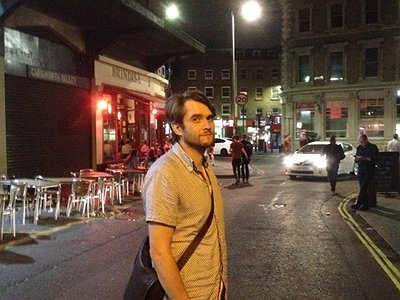Part 1
Name: Derek Walmsley
Nationality: British
Occupation: Writer / Editor
Current Role: Editor at The Wire Magazine
Reading Recommendations: I like Bomb magazine's interviews by artists with other artists: they can evolve in fascinating and wonderful ways. The one between C Spencer Yeh and John Wiese is great / The late Richard Cook, a former editor of The Wire, wrote about jazz with an intellectual scope and aesthetic rigour which is hard to live up to. I recommend reading his Jazz Encyclopedia as an example of a writer at the peak of their powers and drawing upon a carefully marshalled array of intellectual resources. From our current roster of writers, I like how Rob Turner makes connections between different genres – something always important in The Wire – and brings ideas from literature and philosophy into the mix, but always does it playfully and with a lightness of touch
When did you start writing about music - and what or who were your early passions and influences?
Music was always an obsession, but the first publications I paid attention to were computer game magazines, back in the early to mid-1980s, when I was in Junior school. The process of rating aspects of games, trying to understand their structure and scope, and apply scores to them, fascinated me as a young kid. This was the 80s, and the kind of mainstream music I was exposed to was often electronic or at least digital in some way. Technology, and its evolution and iterations, was something that resonated through both music and computer games. I wanted to analyse and decode all these new textures, experiences and spaces to keep pace with this brave new world.
In Secondary school me and my mates and my older brother did the odd photocopied fanzine which we gave to people at school, and we wrote little reviews. I did mostly computer games, my brother did some music. He gave a lukewarm review to Introspective by Pet Shop Boys and I remember thinking "hmm, that's interesting". It seemed to highlight the limitations of trying to formally analyse music, and hint at a fascinating gap between what the artist is trying to do and what the listener hears.
By the time I was towards the end of school, rave music was in full effect: it evolved so rapidly it seemed a sort of advanced laboratory of technological, aesthetic and sensory experimentation. By this time I was trying to make music, not very successfully, on the Commodore Amiga computer. I discovered the Melody Maker, with writers like Simon Reynolds, Neil Kulkarni and Taylor Parkes, whose writing suggested ways of trying to understand and critically engage with this kind of music. I was exhilarated by the intellectual collision of musical knowledge, social comment and philosophising from the hip, and in a nutshell realised I might be better at thinking about music than making it.
There was a recession at the time, and rave was a reaction, proposing people drop out or expand their consciousness. It seemed as if old social consensuses were breaking down (like it does for many teenagers) and writing about music seemed a way of trying to understand what was happening in society.
I started trying to write about music in around 1996 or 97, after going to jungle clubs in London. I was doing tedious temporary work at offices, and on my lunch break try to find the words to describe different styles of MCing and DJing. Around this time I wrote a long email to Simon Reynolds about music, and after a long gap got a really nice and encouraging reply, which was key to encouraging me to work on my writing seriously.
For most journalists, originality is first preceded by a phase of learning and, often, emulating others. What was this like for you? How would you describe your own development as a writer and the transition towards your own style?
The two writers that were particularly catalytic were Reynolds and Peter Shapiro, both of whom were writing at The Wire in the mid to late 1990s. What fired my imagination was their ability to describe music, which can be so immediate and visceral, with such precision and calm detachment. They seemed to solve the old mind-body problem of philosophy, and unite so-called high and low culture in their writing. Like computer-game writing, these writers seemed able to analyse patterns and structures in such depth that they had an idea of where music might go next, almost like weathermen. I should say that these days there's many other writing approaches that fascinate me just as much.
I definitely copped a technique or two from Peter Shapiro. His way of describing a particular piece of music as a mix of two highly disparate things, with a rhetorical flourish that challenged the reader to adjust to his frame of reference, is something that I borrowed a fair bit. Writing about music is often like trying to construct an edifice on constantly shifting sands, and this quick-fire writing seemed a way of building meaning on the fly.
It was a fairly limited pool of writers I drew from directly, I think. David Toop, for instance, was a writer I read avidly but whose subtle, softly constructed layers of cultural allusion was not something I could even consider emulating. Writers from other areas were important to me – I remember Franz Kafka's style being described as sober and precise, and that seemed to me desirable, on both an aesthetic and a moral level.
I was quite serious about wanting to be original, which was more important to me initially than being good, and I remember many times sitting down in front of a blank screen and trying to build paragraphs sentences by sentence, making them more and more sharp. I thought conciseness was a good place to start, and I still think that's a good starting point for any writing. My writing started pretty bad and got better.
What are your main impulses to write about music?
In terms of why I write, natural human curiosity: writing helps crystallise ideas and makes them real, so I write to try and find meaning in the world. In terms of why I write about music specifically, there's a few reasons. I like the ease of access to music compared to other arts: it tends to be relatively cheap to make or distribute (that's why 7" singles are such beautiful things); I also like the way that music, as vibrations in the air, is harder to own than paintings or sculpture.
The big thing for me, though, and it's hard to express, is that because music comes to you as a direct experience of vibrations, without the same kind of spatial experience of say film or art or theatre, you can somehow disappear into it. When you are listening on headphones in a darkened room, for instance, it can take over your senses in a way that other art forms cannot. This is something Arthur Schopenhauer talked about, I think: that because music lacks the 'dimensions' of other artworks. It can feel like a sort of direct expression of the or one's own life force, "we must attribute to music a far more serious and profound significance that refers to the innermost being of the world and of our own self." I think for anyone, like myself, who finds the fabric of the real word a complex and sometimes difficult thing, music has a unique ability to enter your life and shape your reality.
How do you see the role of music journalism in the creative process? Should it amplify public taste, distinguish the good from the bad, inform, promote artists, or, as Howard Mandel put it, “illuminate, educate and entertain” readers?
One way to approach that is when I joined The Wire as a member of staff I learned a lot very quickly from Chris Bohn and Tony Herrington, the Editor and Publisher, about how deeply what the Wire does is strongly founded in journalism (as opposed to criticism, or creative writing, or subjective opinion, etc). The essentials of journalism – explaining the what, why, when, how, where and who of a piece of music – gives you a world of ideas and context and history to explore in your writing, even if you are just writing about a house 12" single. The single biggest lesson I've learned working at The Wire, and the main thing I try to inculcate in writers who are developing their style, is that journalism benefits art criticism of any sort, but particularly music, which can be so quick-fire and populist (even in its most extreme forms). Journalism was the big literary revolution of the 20th century, if you think of the range of writers, from Hunter S Thompson to Joan Didion, who came through new journalism. Even a highly playful and sophisticated music writer like David Toop probably filed the best part of a thousand pieces of journalism, music and otherwise, in his formative professional years.
I've always viewed what I've done as music journalism, which I take as having an essential critical function. It should certainly inform, and illuminate, and if it is doing those jobs really, really well, with flair and wit and opinion, then it will start distinguishing the good from the bad just by its very existence.
In which way does writing and reading about music change the way it is perceived?
Profoundly, for sure. That process is part of why I would so eagerly devour magazines like The Wire. A certain observation in a record review can make you feel the space of the music differently, or highlight a certain distance or tension or awkwardness or irony or kitsch or satire that you didn't feel before.
I've always been interested in music which is somehow flawed, or reviews which don't immediately make clear whether they are positive or negative, but leave the reader to make up their own mind; The Wire in particular had a really powerful effect on me in terms of criticism which illuminated aspects of the music and then left you to reflect on where this left you.






